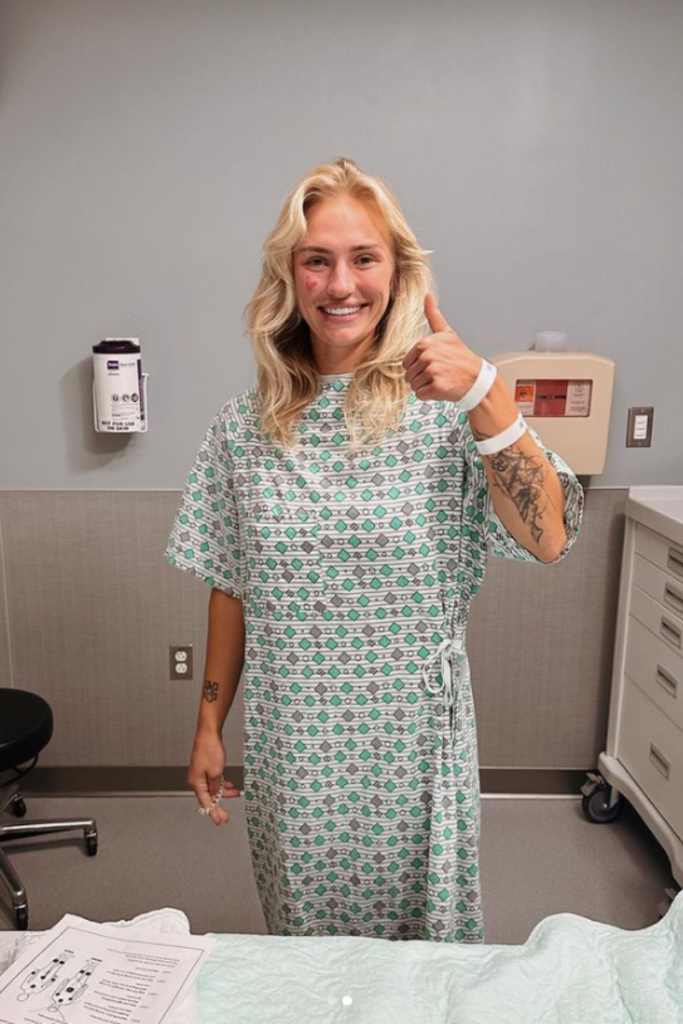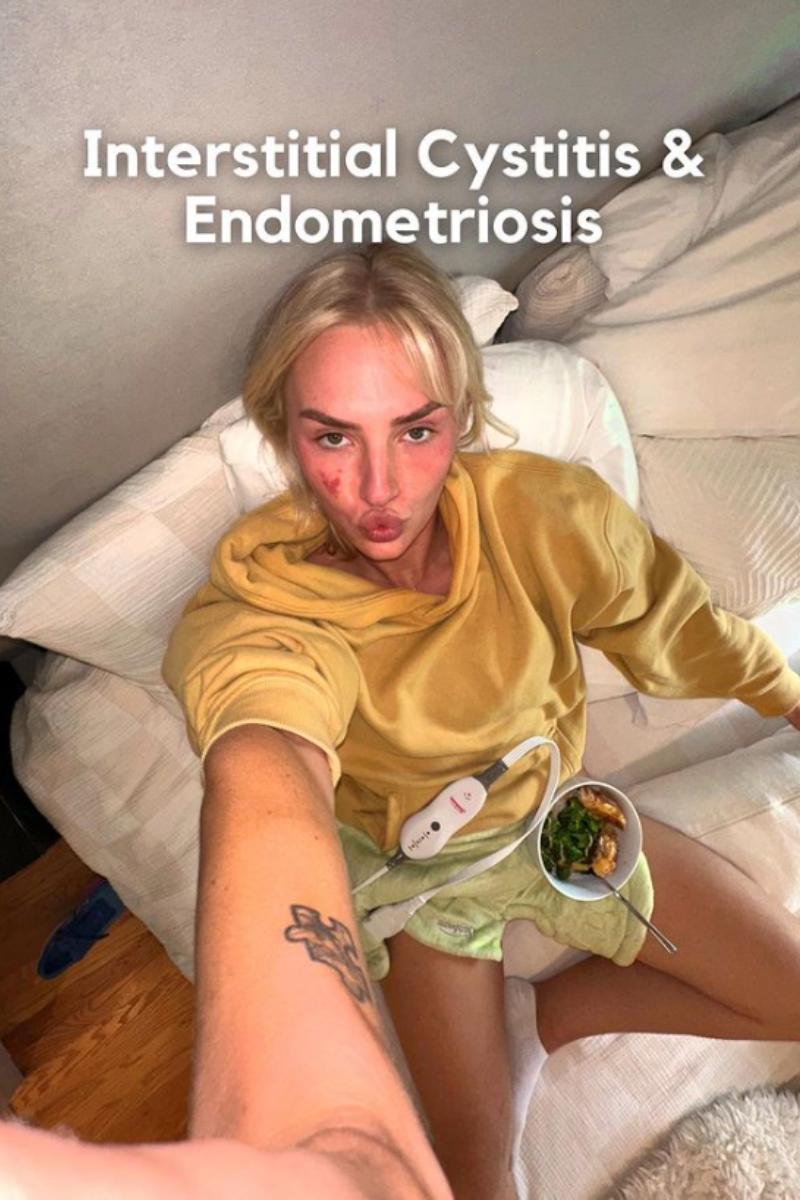“Did they find anything?” I asked groggily as the anesthesia wore off from surgery.
“Yes, honey. They found endometriosis,” the post-op nurse answered.
“So I’m not crazy? I’m really not crazy?!?” I cried.
My endometriosis story begins
On August 9, 2023, I was diagnosed with stage two endometriosis that had infiltrated my right ovary and my large intestine. They found adhesions fusing my large intestine and ovary together, causing a large bowel obstruction, a cyst, and an ovary that was an hourglass shape, showing remnants of a large cyst that had recently ruptured.
Like many people with endometriosis, my diagnosis was something I fought hard for. For 10 years, my pain, inflammation, and cries for help were disregarded. I was gaslighted by doctor after doctor who misdiagnosed me, told me I was crazy, or labeled me a hypochondriac. I was handed drug addiction pamphlets, and I was referred to mental hospitals.
Over the years, I learned to filter my emotions to be taken seriously. I was afraid doctors would look for any evidence of my emotions or mental illnesses influencing how I felt pain.
After 10 years, I was about to give up. Endometriosis wasn’t something they had ever mentioned until four months prior to my laparoscopic surgery.
Oddly enough, my endometriosis story didn’t start with painful periods. That said, I have had very painful and heavy periods since my first menstruation. However, I thought painful and heavy periods were normal. My mom had them, and so running through a box of super tampons every two days didn’t seem weird to me at all.
What started my journey was actually chronic UTIs. I had started getting UTIs when I was a freshman in high school, and I was getting them at least eight to 10 times per year. They would come on fast, and I would regularly urinate blood and blood clots despite having good hygiene and being a very healthy teenager. When I would get them and go to urgent care or the ER if it was really bad, they would just hand me antibiotics. So when telehealth became a thing, it was the best thing ever because I could quickly get prescribed antibiotics in the comfort of my own home and not spend crazy amounts of money to sit in waiting rooms.
Gaslighting and misdiagnoses
Until one day, five years after the beginning of my chronic infections, one telehealth doctor looked at my charts and saw how many UTIs I had and how they progressively got worse and more frequent as time passed. She refused to treat me and told me that I had to go to urgent care where they did urine cultures. The test came back negative for infection. But despite the negative test, they still prescribed me antibiotics.
I was also referred to a urologist for the first time, where I was asked, “Are you sure the blood in the toilet you are seeing isn’t just period blood?” I never went back to him.
At this time, I was 22, and my career started to explode. I worked non-stop, and I noticed my body shutting down and hitting burnout more frequently. My joints hurt, I was chronically fatigued, chronically inflamed, still getting what I thought were UTIs, my toes were turning blue and green, I was getting rashes on my face, my bowel movements were never normal and always painful, I started getting male patterned hair growth on my stomach, mustache, and chin, and out of the blue, I started getting severe cystic acne all over my body.
I tried hard to ignore my symptoms, but they were affecting every single part of my life.
That year I refer to as “The year of weird,” because it seemed like I went to a new doctor every week. A rheumatologist diagnosed me with lupus, a cardiologist diagnosed me with Raynaud’s, a few different urologists diagnosed me with IC, a new gyno diagnosed me with PCOS, and a gastroenterologist diagnosed me with IBS.
For the next three years, I was distraught. It seemed like every day I was waking up, getting a new diagnosis, and all of my symptoms were getting worse. My symptoms included bladder pain, bladder inflammation, overall body inflammation, urinating blood and blood clots, diarrhea, constipation, painful intercourse, and fatigue. Whenever I would message my doctors saying something was not right, I was directed to new doctors or told to keep managing symptoms because these were the cards I was dealt with.
When I turned 25, I spent thousands and thousands of dollars on ER visits, urgent care visits, medications, and doctors’ appointments. I had this gut feeling the diagnoses I collected were symptoms of a much larger problem. But no imaging, ultrasounds, or blood tests indicated that there was anything wrong in my body. To be blunt, I really felt like I was going to die, and they would not find out what was wrong with me until an autopsy.
I began speaking about everything I was going through on social media, and the outpouring of love and understanding was overwhelming. I heard stories just like mine from women all over the world, and it was the first time I had heard about endometriosis. Whether it was denial or an overall misunderstanding of how common this “thing” was among women, I brushed it off.
I remember Googling it and seeing three of the most common indicators of this really painful disease were:
- a family member having it
- painful periods
- infertility
But no one in my family has or had it, and no one in my family has had issues with getting pregnant. I did not think my periods were painful enough.
My doctors finally listened and heard me
During all of this, someone told me about Bindi Irwin’s story. Her story hit me like a ton of bricks. So much so that I took a small chance and listened to the recommendation of another person to join the Nancy’s Nook Facebook Group to find an endometriosis specialist in my area. I also went to the Endometriosis Foundation of America’s website and printed out their personal pain profile worksheets to document my symptoms and when they happened around my cycle.
Three weeks later I was sitting in Dr. Mini’s office with her nurse practitioner shaking and in tears because I was so nervous they wouldn’t take me seriously.
45 minutes went by of me going through the worksheets I filled out, and the nurse taking notes on everything I said.
She looked at me and said, “It’s probably been awhile since someone listened to you and taken you seriously. I want you to know that I believe you, and you are in good hands.”
They gave me three options:
- Different birth control
- Do nothing
- Laparoscopic surgery

And the next thing I know, I had my exploratory surgery booked two months out.
I’m telling you my story because I know how isolated you may feel right now. I wrote off my period pain as something I shouldn’t be concerned about. Even though I would take full days off of work because it was so painful. Every person with a uterus is supposed to have bad period cramps, right? Some people have really heavy periods and that’s normal, right?
No.
Period pain is not normal, but it is normalized and very common. That is why so many women don’t think it’s a symptom of something much larger like endometriosis. Endometriosis is not just a period disease, it’s a FULL BODY disease that can travel all the way up to your heart and brain. It can lead to cancer if untreated, and it is estimated that one in 10 women around the world have it regardless of being diagnosed or not.
Indicators and symptoms of this disease have a wide range, and you don’t have to have every single one of them to be diagnosed. Afterall, no one in my family has it. My mom is a survivor of breast cancer, and my dad currently has prostate cancer. Any family member with a disease or cancer that involves reproductive organs and hormones can be an indicator.
Advocating for yourself is a lonely and long process. It takes a lot of patience, self-love and a support system which I hope you can find in the comments here. Please don’t be shy about asking questions, or commenting back to people who have questions!!
Endometriosis symptoms and how to get tested
- Write down and track any and all symptoms you find weird/painful. Like I did above! EVEN ONES YOU DON’T THINK ARE RELATED TO YOUR PERIOD. Be as specific as possible. And trace period symptoms all the way back to when you first got one!
- You can get an ultrasound and blood work done, but remember that 99% of endometriosis cases cannot be seen in any imaging and blood work is known to come back normal.
- Hormone testing is helpful if you can get a doctor that knows how to read them- The one I did was called “dutch plus”. But again, remember, it can come back normal with endo!
- Having an endo gynecologist who specializes in laparoscopic excision surgery is the only way to formally diagnose endo — unfortunately there are very few who know how to do it so I recommend Nancy’s Nook Facebook group. You can join and find a specialist in your area!
- You WILL get gaslit, and you WILL be told your symptoms are common. Do not let this stop you from seeking answers— No one knows endo pain unless they’ve experienced it themselves.
I only had the courage to get my diagnosis surgery through the support of my online friends here ♥️


Thank you for sharing your story! The normalization of period pain needs to stop. I just thought mine worsening to the point to crippling was just part of the aging process. I had multiple large fibroids which led to my diagnosis of stage 4 endometriosis. I can’t imagine what the process would have been like if I tried to get a diagnosis earlier on. I’m so glad someone finally listened to you!
Side note – for blood work, super important to find a gyno who is well versed in all gynecological issues. My CA-125 (a cancer marker) was through the roof from the endometriosis and fibroids but I had to get a second opinion to learn it’s not always cancer related 😰